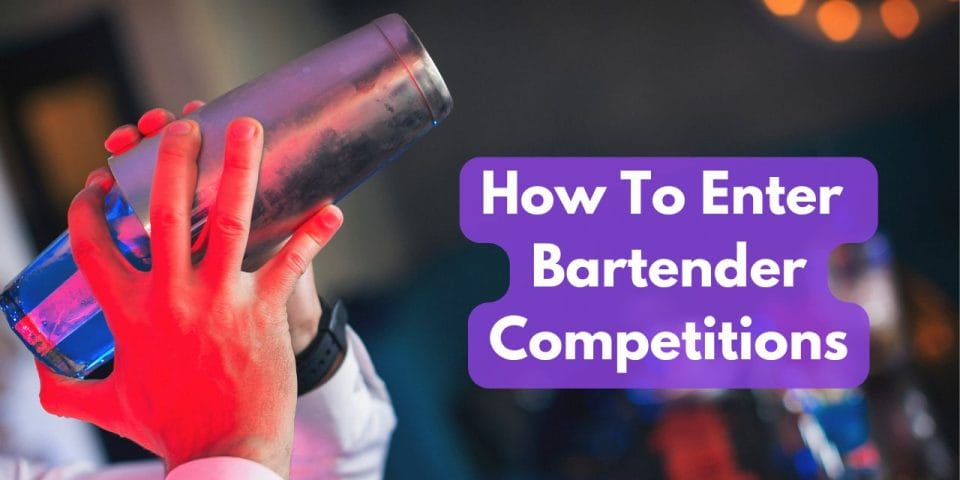Bartender competitions have gained popularity in recent years, providing an enjoyable platform for Bartenders to showcase their skills and creativity. These contests offer great opportunities for personal and professional growth.
This article will guide you on how to enter Bartender competitions, discuss their benefits and share practical tips for preparing and succeeding in these events.
What Are Bartender Competitions?
Bartender competitions come in many forms, from local events held in your city to national and international contests that attract top talent from around the world. They typically assess a range of skills such as creativity, cocktail preparation techniques, speed and presentation.
The benefits of participating in these competitions are numerous. Not only do they enhance your professional skills and push you to innovate, but they also open doors to networking with industry professionals.
Engaging in competitions can lead to greater visibility in the bartending community, as success can result in recognition and exciting career advancements. Additionally, many competitions offer awards that can include cash prizes, scholarships or job opportunities, making them worthwhile investments in your career.
Preparing To Enter Bartender Competitions
Preparation is vital when entering Bartender competitions because it allows you to approach the event with confidence and clarity.
A well-thought-out strategy helps ensure that you’ve considered all aspects of the competition, from crafting your cocktails to understanding the judging criteria.
Research and selection
Start by identifying suitable competitions that match your skill level and interests. Look for events that are well-organized and have a positive reputation in the industry. Take the time to fully understand the rules and judging criteria for each event you’re considering.
This knowledge will give you insight into what judges are looking for and help you tailor your preparation accordingly. Additionally, evaluate the resources and commitment required to enter each competition, as this can impact your overall experience.
Skill building and practice
Once you’ve selected a competition, focus on honing your skills. Developing unique cocktail recipes and practicing precision in your preparation will give you a solid foundation for the competition.
Consider practicing in front of peers or friends who can provide constructive feedback. Engaging in mock competitions can help build your confidence and uncover areas for improvement.
Furthermore, enhancing your storytelling abilities when presenting your cocktails can make a significant difference, as judges often appreciate a compelling narrative behind each creation.
The Entry Process
Entering a Bartender competition requires more than just talent; it involves a detailed and organized application process. Ensuring that all components are well-prepared can significantly enhance your chances of success. Follow these steps to approach the entry process effectively:
- Gather necessary documents: Start by compiling essential materials, including your resume and a portfolio that showcases your best work as a Bartender.
- Craft a compelling application: Highlight your journey by emphasizing your signature drinks and unique experiences. Make sure your application tells your story in an engaging way.
- Prepare for video entries or written proposals: Depending on the competition, you may need to submit video demonstrations or written submissions. Be sure to follow the specific submission guidelines for each competition closely.
- Understand legal and health requirements: Familiarize yourself with any necessary permits and certifications that may be required for the competition. Requirements can vary based on the event’s location and scope.
- Manage costs associated with participation: Consider the financial aspects, including entry fees and travel expenses. Planning for these costs will help you manage your budget effectively.
Performance Tips
Performing well in a competition requires talent, confidence, presentation skills and creativity. Here are some key points to consider:
- Presentation and style: Dress appropriately for the competition, ensuring your attire reflects the event’s theme while allowing for free movement. Demonstrating flair, professionalism and confidence is essential, and engaging body language can enhance judges’ impressions.
- Cocktail creativity: Use unique ingredients and innovative techniques to stand out. Balance creativity with taste, as a successful cocktail must be both delicious and visually appealing. Don’t hesitate to experiment, and consider the story behind your drink to add a compelling narrative.
- Engaging the judges: Strong communication skills are vital for connecting with judges. Be ready to articulate your cocktail choices, answer questions about your methods and share your creative process. Approach feedback with an open mind to foster a positive connection with the judges.
After the Competition
What you do after the competition can be just as important as your performance itself. Reflecting, leveraging your experience and maintaining connections are crucial for long-term success in the industry.
Reflecting on performance
After the competition concludes, take time to gather insights and feedback from judges. Reflecting on your performance allows you to identify strengths and areas for improvement.
Consider keeping a journal of your experiences, noting what worked well and what didn’t, so you can continue to grow and refine your skills for future competitions.
Leveraging experience
Updating your resume and portfolio with your competition experiences is essential for showcasing your expertise. This not only demonstrates your commitment to your craft but also serves as a conversation starter when networking within the industry.
Sharing your journey on social media and other platforms can increase your visibility and attract potential job opportunities. Building relationships with fellow competitors and industry professionals can lead to collaborations and mentorships that further enrich your bartending career.
Popular Bartender Competitions in the US
Knowing about the different competitions available can help you find the ones that suit your skills and interests. Here are some popular Bartender competitions held across the United States that you might consider entering:
- United States Bartenders’ Guild (USBG) National Cocktail Competition: This prestigious event highlights the creativity and skills of Bartenders from various regions, showcasing some of the best talents in the industry.
- Tales of the Cocktail Cocktail Competition: An internationally recognized competition that takes place during the annual Tales of the Cocktail festival in New Orleans, it serves as a platform for innovative cocktail culture and creative bartending.
- Speed Rack: Exclusively for female Bartenders, this competition tests speed and cocktail-making skills while raising funds for breast cancer research. It’s not just about speed — creativity and presentation are key factors as well.
- Bar Fight! A Spirited Competition: This friendly, high-energy competition allows Bartenders to demonstrate their creativity and skills in a supportive environment, making it a fantastic entry point for those new to competitive bartending.
- Most Imaginative Bartender Competition: Sponsored by Bacardi, this event focuses on innovation in crafting cocktails, often featuring themed rounds that challenge participants to push their creativity to the limit.
Conclusion
Understanding how to enter Bartender competitions is essential for any Bartender looking to enhance their skills and advance their careers. By exploring the types of competitions available, preparing effectively and performing with confidence, you can significantly increase your chances of success.
For Bartenders seeking additional career advice and industry insights, consider checking out OysterLink. This platform offers valuable resources designed to help you navigate your bartending journey, from job opportunities to guidance on skill development.
How To Enter Bartender Competitions: FAQ
If you are new to competitions, starting with smaller, local contests can be a great introduction. Additionally, preparing thoroughly, practicing your skills and seeking advice from experienced competitors can help ease any apprehension you may have.
Time management is crucial when balancing work and competition preparation. Consider setting a schedule that allocates specific times for practice and research while ensuring you fulfill your bartending responsibilities.
Judges typically evaluate creativity, taste, presentation, technique and the story or concept behind the cocktails. Understanding these criteria can help you tailor your preparation to achieve better results.
Many Bartender competitions have age restrictions, often requiring participants to be at least 21 years old. It is essential to check the specific rules for each competition you plan to enter to ensure you meet their requirements.
Some competitions allow team entries, while others require individual participation. It is important to review the competition guidelines to determine whether you can participate with other Bartenders or if the competition is strictly a solo event.

Written by Sasha Vidakovic
Sasha is an experienced writer and editor with over eight years in the industry. Holding a master’s degree in English and Russian, she brings both linguistic expertise and creativity to her role at OysterLink. When she’s not working, she enjoys exploring new destinations, with travel being a key part of both her personal and professional growth.

Reviewed by Marcy Miniano
Marcy is an editor and writer with a background in public relations and brand marketing. Throughout her nearly decade-long career, she has honed her skills in crafting content and helping build brands across various industries — including restaurant and hospitality, travel, tech, fashion and entertainment.




